
 i_need_contribute
i_need_contribute

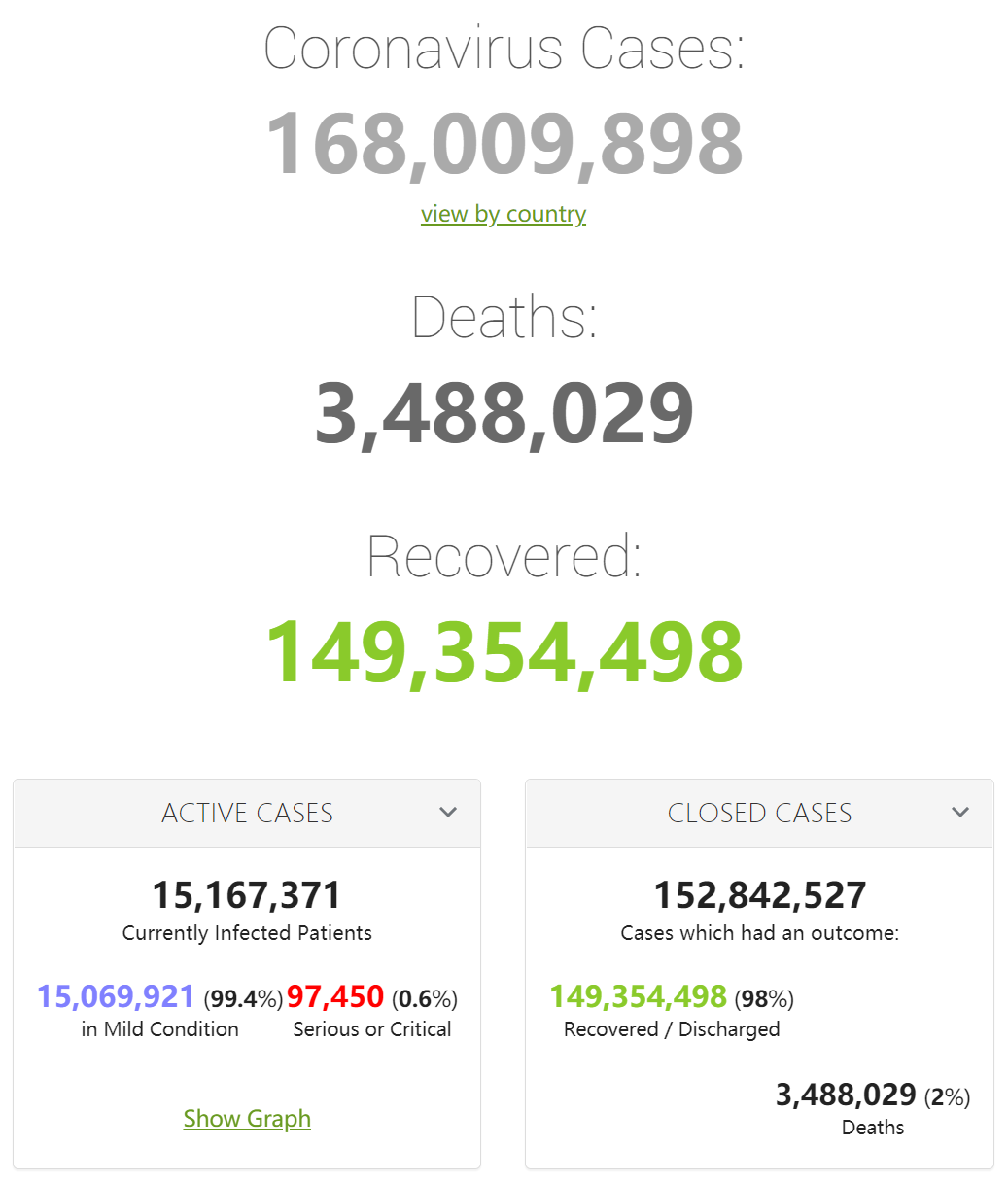
|
Country, |
Total |
New |
Total |
|
World |
167,979,083 |
+443,043 |
3,486,946 |
|
33,922,937 |
+19,866 |
604,416 |
|
|
26,947,496 |
+195,815 |
307,249 |
|
|
16,121,136 |
+37,563 |
450,026 |
|
|
5,605,895 |
+2,229 |
108,658 |
|
|
5,194,010 |
+7,523 |
46,446 |
|
|
5,009,911 |
+8,406 |
118,801 |
|
|
4,464,900 |
+2,439 |
127,724 |
|
|
4,194,672 |
+2,490 |
125,335 |
|
|
3,659,990 |
+5,789 |
88,039 |
|
|
3,647,520 |
+3,624 |
79,711 |
|
|
3,562,135 |
+22,651 |
74,480 |
|
|
3,249,433 |
+16,977 |
85,207 |
|
|
2,866,181 |
+559 |
72,945 |
|
|
2,843,523 |
+11,005 |
78,848 |
|
|
2,396,604 |
+1,274 |
221,647 |
|
|
2,183,855 |
+1,334 |
49,436 |
|
|
1,926,923 |
+1,634 |
68,358 |
|
|
1,781,127 |
+5,907 |
49,455 |
|
|
1,658,083 |
+197 |
30,037 |
|
|
1,637,848 |
+2,383 |
55,874 |
|
|
1,628,922 |
+2,690 |
17,553 |
|
|
1,361,564 |
+2,384 |
25,265 |
|
|
1,335,261 |
+5,343 |
28,548 |
|
|
1,184,706 |
+4,973 |
19,983 |
|
|
1,172,042 |
+4,102 |
16,214 |
|
|
1,075,773 |
+230 |
29,977 |
|
|
1,048,881 |
+1,753 |
24,842 |
|
|
903,599 |
+3,047 |
20,308 |
|
|
845,465 |
+241 |
17,018 |
|
|
839,361 |
+42 |
6,406 |
|
|
802,346 |
+258 |
29,560 |
|
|
790,521 |
+1,441 |
12,401 |
|
|
731,436 |
+890 |
9,384 |
|
|
718,864 |
+4,045 |
12,312 |
|
|
710,315 |
+376 |
6,788 |
|
|
641,740 |
+360 |
10,547 |
|
|
557,619 |
+1,512 |
1,654 |
|
|
538,668 |
+150 |
7,684 |
|
|
520,461 |
+7,220 |
6,531 |
|
|
518,600 |
+6,509 |
2,309 |
|
|
517,113 |
+90 |
9,126 |
|
|
442,071 |
+1,157 |
7,264 |
|
|
419,198 |
+347 |
20,210 |
|
|
416,727 |
+81 |
17,513 |
|
|
391,181 |
+1,377 |
11,822 |
|
|
388,854 |
+19 |
12,296 |
|
|
386,978 |
+953 |
2,780 |
|
|
375,014 |
+1,832 |
3,805 |
|
|
374,356 |
+235 |
6,346 |
|
|
354,060 |
+74 |
7,929 |
|
|
349,653 |
+1,466 |
13,965 |
|
|
337,961 |
+388 |
4,639 |
|
|
336,414 |
+1,069 |
12,273 |
|
|
335,691 |
+2,720 |
8,474 |
|
|
332,610 |
+156 |
4,867 |
|
|
305,777 |
+576 |
3,470 |
|
|
304,529 |
+1,139 |
3,849 |
|
|
300,455 |
+1,240 |
1,741 |
|
|
284,567 |
+838 |
3,610 |
|
|
274,413 |
+919 |
2,509 |
|
|
271,145 |
+284 |
4,203 |
|
|
269,500 |
+306 |
4,084 |
|
|
267,888 |
+2,790 |
3,922 |
|
|
259,050 |
+345 |
4,941 |
|
|
254,984 |
+1,149 |
14,766 |
|
|
254,741 |
+65 |
6,080 |
|
|
251,773 |
+83 |
4,355 |
|
|
247,644 |
+190 |
8,009 |
|
|
232,672 |
+531 |
6,146 |
|
|
224,819 |
+1,474 |
2,528 |
|
|
221,982 |
+34 |
4,394 |
|
|
220,847 |
+2,800 |
848 |
|
|
215,742 |
+299 |
547 |
|
|
211,221 |
+857 |
2,274 |
|
|
183,592 |
+281 |
3,112 |
|
|
168,543 |
+111 |
3,073 |
|
|
167,172 |
+2,971 |
1,243 |
|
|
166,061 |
+42 |
2,067 |
|
|
143,262 |
+28 |
3,216 |
|
|
136,467 |
+538 |
1,934 |
|
|
134,208 |
+1,155 |
890 |
|
|
132,215 |
+6 |
2,445 |
|
|
132,213 |
+2,713 |
806 |
|
|
131,079 |
+134 |
2,328 |
|
|
128,669 |
+77 |
1,241 |
|
|
127,107 |
+247 |
3,426 |
|
|
122,652 |
+238 |
782 |
|
|
102,702 |
+191 |
1,757 |
|
|
99,291 |
+43 |
1,574 |
|
|
98,657 |
+206 |
680 |
|
|
93,644 |
+24 |
783 |
|
|
93,279 |
+78 |
1,271 |
|
|
91,619 |
+93 |
939 |
|
|
90,991 |
+18 |
4,636 |
|
|
72,674 |
+145 |
2,220 |
|
|
13,302 |
+191 |
256 |
|
|
10,922 |
+5 |
107 |
|
|
5,404 |
+187 |
44 |
Retrieved from: https://www.worldometers.info/coronavirus/
From CNN’s Esha Mitra in New Delhi
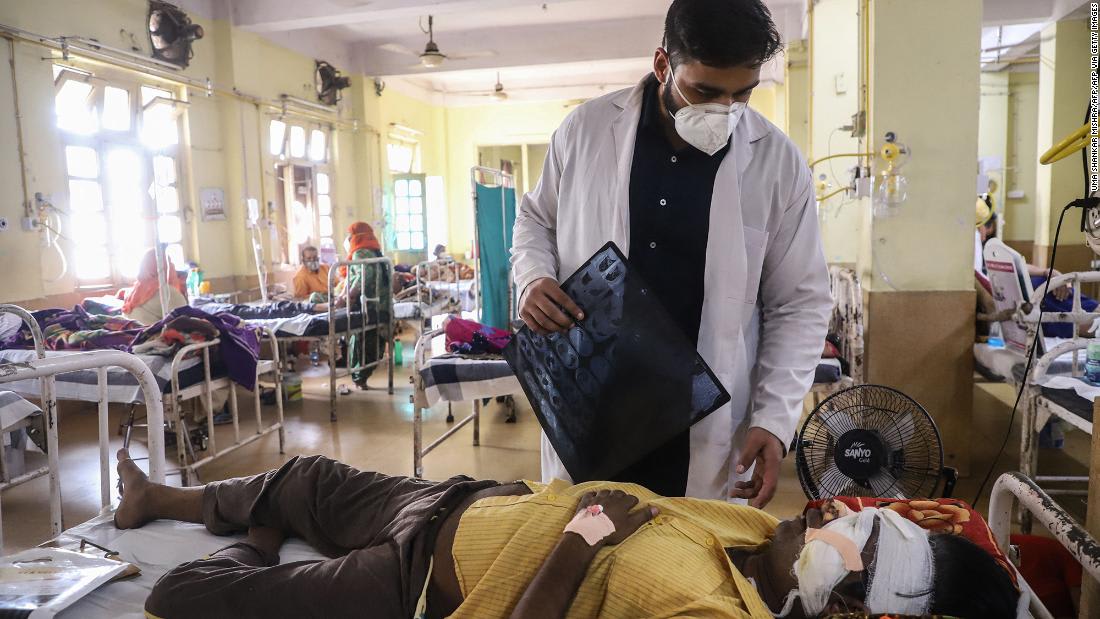
Data on genome sequencing shared during a Covid-19 review by the Indian Minister of Health indicates that B.1.617 is the most dominant mutant variant in India.
Out of 25,739 positive Covid-19 samples sequenced, the variant B.1.617 was found in 5,261 of them, making it "the most common mutation detected till now,” the Indian Ministry of Health and Family Welfare said in a statement Monday.
In March, India's health ministry said the Covid-19 variant which was first detected in the UK was the most prevalent in the country. But B.1.617 has since grown in prevalence following the second wave which has torn through the country.
India has not only been struggling with an increasing number of mutant variants, but also a strain of infections of "black fungus" -- a rare and potentially deadly disease called mucormycosis.
Many of those being infected with the "black fungus" are coronavirus patients, or those who have recently recovered from Covid-19, meaning their immune systems have been weakened by the virus.
Based on an analysis of 5,424 cases of black fungus reported in the country, 4,556 cases had a history of Covid-19 infections. Health minister Harsh Vardhan on Monday said 55% of those affected also had diabetes, leaving them more vulnerable to the disease.
The latest figures from the Ministry of Chemicals and Fertilizers said there are at least 8,848 cases of black fungus in the country.
From journalist Fernanda Wenzel in Porto Alegre, Brazil
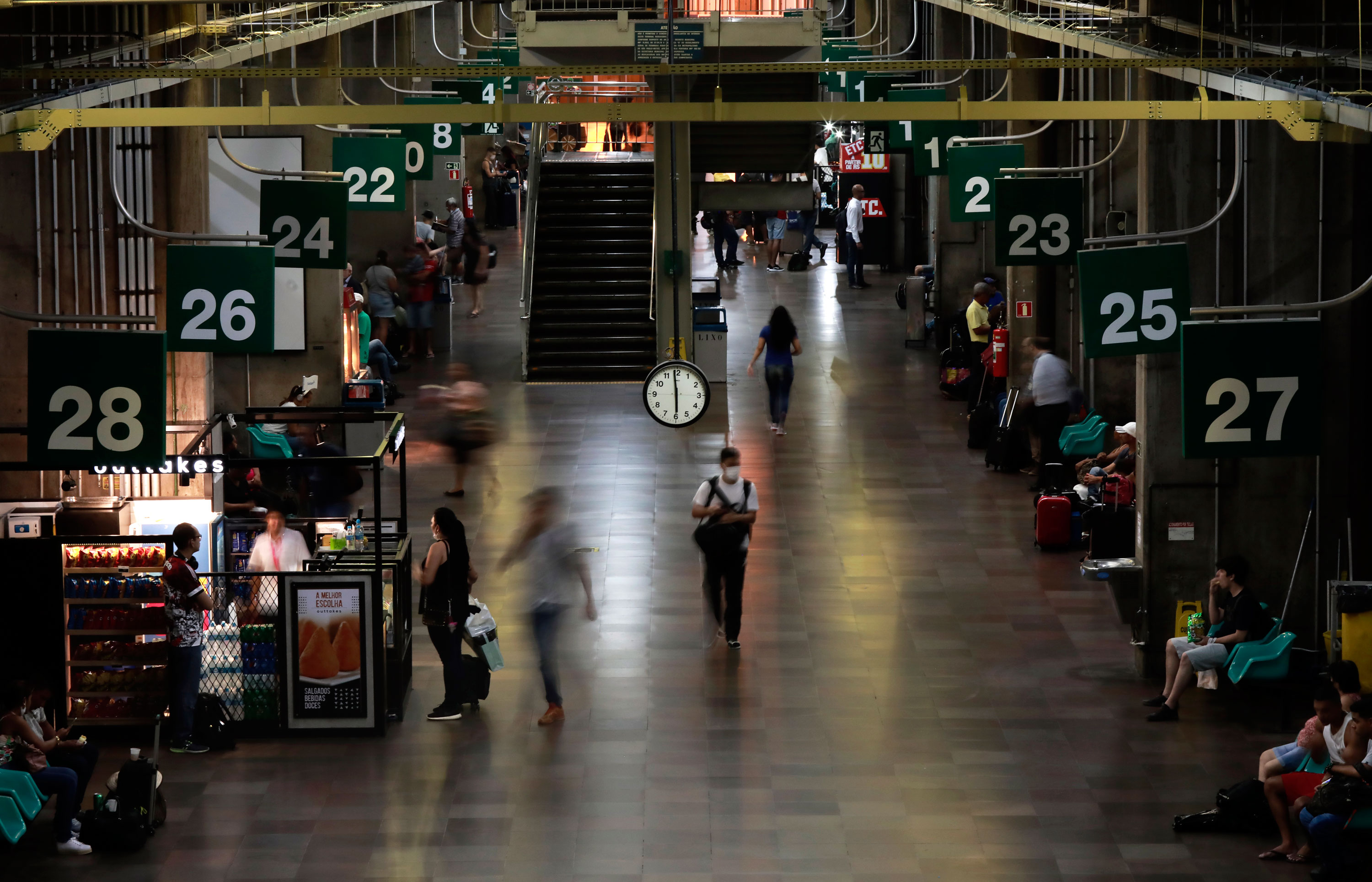
Tietê bus station on March 19 in Sao Paulo, Brazil. Rodrigo Paiva/Getty Images
São Paulo's government on Monday announced plans to restrict the coronavirus variant first identified in India from reaching Brazil’s most populous metropolis, after one confirmed case and other suspected infections were detected in the country's northeast.
Symptomatic passengers coming through the Tietê bus station, one of the busiest in the country, will be sent to hospital facilities for Covid-19 tests, a city government statement said. Symptomatic truck drivers traveling on highways will also be tested.
The move follows a news conference held this weekend by Brazilian Health Minister Marcelo Queiroga, who announced measures aimed at preventing the spread of the B.1.617 variant in the hopes of preventing community transmission.
The federal government’s first measure was to send 600,000 rapid tests to the northeastern state of Maranhão, where the first case of the new variant was detected in Brazil.
The patient is a 54-year-old man who was aboard a ship that traveled to Brazil from Malaysia. The patient has been hospitalized in São Luís, Maranhão's capital, since May 14.
According to Queiroga, the tests will be used on passengers in airports and at the state’s borders. "Any passenger with a positive rapid test will have to take a RT-PCR test with genomic research to verify the Indian variant,” the minister said.
The same strategy will be replicated in Guarulhos, Brazil’s busiest airport, in the state of São Paulo, and on the main roads and bus terminals in Rio de Janeiro and São Paulo.
Last week, the Brazilian government banned flights coming from or transiting through India, the United Kingdom, Northern Ireland or South Africa from entering the country.
In addition to Maranhão, one suspected case of the variant first identified in India is being investigated in the state of Ceará, also in the northeast region, and two cases are under investigation in the state of Pará, in the north of Brazil, according to statements from those state governments.
From CNN's Nick Paton Walsh
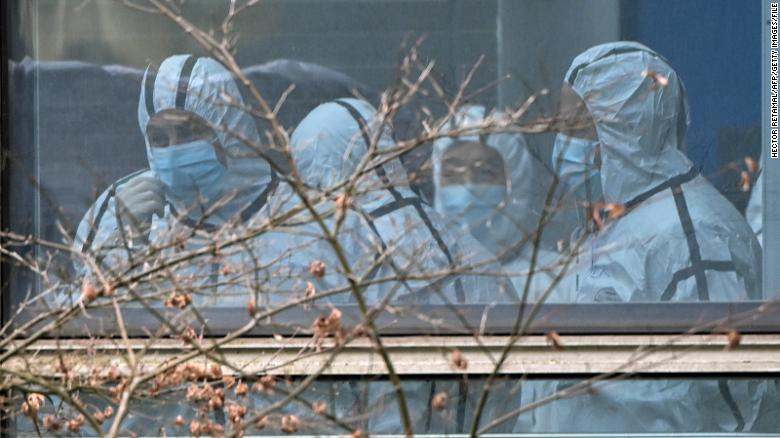
Previously overlooked Chinese data on extensive screening of animals for coronavirus around the time the pandemic erupted is among several areas identified for further study by World Health Organization (WHO) scientists investigating the origins of Covid-19, a source close to the team told CNN.
The source said the records are contained in a nearly 200-page annex posted alongside the WHO panel's March report that received little attention among global experts at the time. But the data may add weight to calls from China's critics for more transparency and to the WHO team's desire to return to the country for further studies.
No date has been set for the team's return to China, but the source said any future visit to the country -- where the virus emerged in the city of Wuhan, Hubei province, in late 2019 -- may involve "smaller groups supporting specific studies first." A larger group, similar to the 17 international experts that visited in January, might then follow up, the source added.
The WHO report's annex contains multiple data points providing an intriguing insight into China's evolving knowledge of the virus and the likely timing of its emergence.
It provides details of China's storage and destruction of positive Covid-19 samples from humans; a significant influenza outbreak that emerged in December 2019, at the same time as the virus; and the revelation that the first people known to have contracted the virus had contact with a total of 28 separate food and animal markets in December.
From CNN's Rebecca Wright and Yasmin Coles
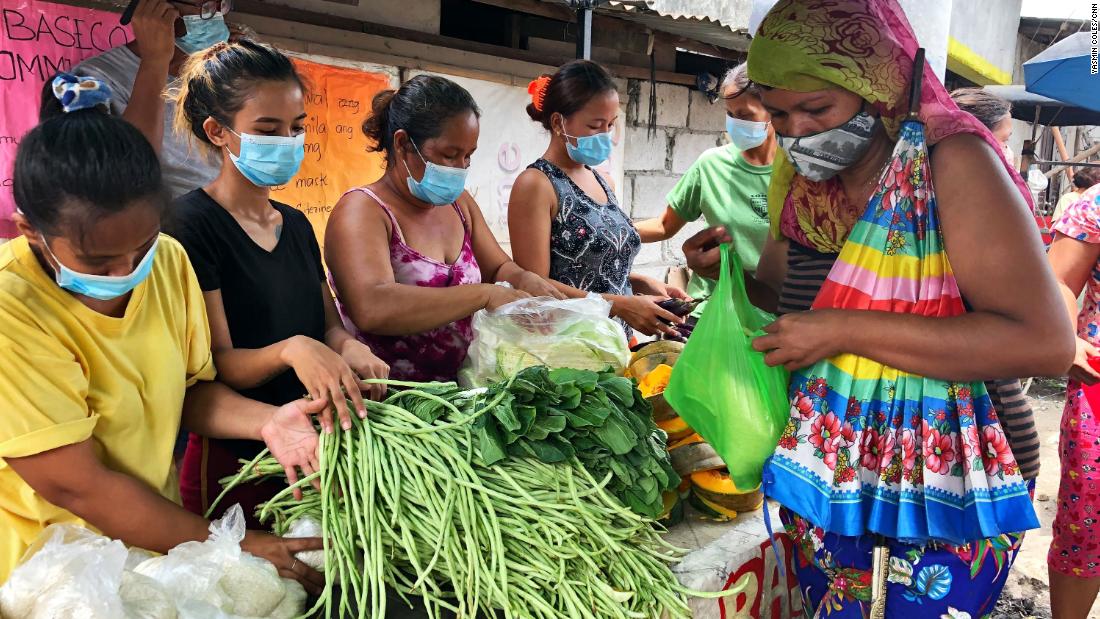
With nine children and one grandchild, life was hard for Mona Liza Vito and her family even before the pandemic.
Vito used to work long hours peeling sacks of garlic, making about $2 a day, while her husband worked as a day laborer in construction. But now their work has dried up, a casualty of an economic downturn in the Philippines after multiple coronavirus lockdowns. And trying to feed so many mouths has become a daily struggle for survival.
"We don't have anything for my children's food, for our daily expenses," Vito said. "Sometimes, at night, we don't have anything to eat, we can only wait for the next day."
Vito lives in Baseco Compound, one of the poorest areas of Manila, where almost 60,000 people are crammed onto a patch of reclaimed land in the capital's port area. The sprawling settlement relies almost exclusively on the economic activity around the dock -- most of which has ground to a halt. And the lockdowns have included bans on fishing in the sea, a lifeline for many.
"If they don't catch fish, there is nothing to eat. Some just live on burnt rice and salt with water," said Nadja de Vera, Project Coordinator of local organization, Tulong Anakpawis. "It remains shocking with the amount of poverty here."
The Philippines was one of Asia's poorest countries even before the pandemic. Towards the end of 2020, nearly a quarter of Filipinos were living in poverty, surviving on about $3 a day, according to the World Bank.
More than 3 million children in the Philippines have stunted growth, and 618,000 children are classed as "wasted" -- defined by the World Health Organization as low weight for height, which usually occurs due to lack of adequate food or prolonged illnesses. That's among the highest rates in the world -- and the figures were recorded before the most recent lockdown that started in March.
Desperate to avoid more lockdowns and kickstart the faltering economy, the government is now pinning its hopes on vaccines.
But while health experts say vaccination is a crucial tool in bringing an end to the pandemic, many Filipinos are skeptical, and vaccination take-up remains dangerously low.
Retrieved from: https://edition.cnn.com/world/live-news/coronavirus-pandemic-vaccine-updates-05-25-21/index.html

A vaccination site at Brent Central Mosque in London in early April.Credit...Andrew Testa for The New York Times
A new and potentially more contagious variant of the coronavirus has begun to outpace other versions of the virus in Britain, putting pressure on the government to shorten people’s wait for second doses of vaccines and illustrating the risks of a faltering global immunization drive.
The new variant, which has become dominant in India since first being detected there in December, may be responsible in part for a virus wave across Southeast Asia, including Nepal.
Efforts to understand the variant picked up once it began spreading in Britain, one of at least 49 countries where it is present. Scientists there are sequencing half of all coronavirus cases.
The preliminary results out of Britain, drawn from a few thousand cases of the variant, contained both good and bad news, scientists said.
The variant, known by evolutionary biologists as B.1.617.2, is “highly likely” to be more transmissible than the variant behind Britain’s devastating wintertime surge, government scientists have said.
Helpfully for Britain and other wealthy nations, the variant has emerged at a less dire moment of the pandemic. More than four out of every five people in England above age 65 have been given both doses of a coronavirus vaccine, driving down hospitalizations and deaths.
And a new study by Public Health England offered reassuring signs that fully vaccinated people were well protected from the variant.
The Pfizer-BioNTech vaccine offered 88 percent protection against the variant first sampled in India, only a slight drop from the 93 percent protection given against the variant from Britain, Public Health England said. The AstraZeneca-Oxford vaccine was 60 percent effective against the variant from India, compared with 66 percent against the one first seen in Britain.
Because people in Britain started receiving AstraZeneca’s vaccine later than Pfizer’s, they have been followed for a shorter period, meaning that the effectiveness figures for that vaccine may underestimate the true numbers, scientists said. Other studies in England have shown little to no difference between the effectiveness of the Pfizer and AstraZeneca vaccines.
For now, a rise in cases of the variant from India has not caused an overall surge in the virus in Britain. And not all scientists are convinced that the variant is as contagious as feared. The true test will be whether it surges in other countries, especially those — unlike Britain — that are grappling with high case counts of other variants, Andrew Rambaut, a professor of molecular evolution at the University of Edinburgh in Scotland, wrote on Twitter.
In Britain, part of its rapid growth may have to do with the particular places it was first introduced. Bolton, in northwestern England, where the new variant is most advanced, is a highly deprived area with tightly packed housing that could be hastening its spread, scientists said.
“We do not know if the increase in transmissibility is the result of specific mixing patterns, or super-spreading events,” a group of researchers led by Robert Challen of the University of Exeter reported on May 11, in a study that was among those presented to an influential government advisory group.
That government advisory body said several days later that it had “high confidence” that the variant first seen in India was indeed more contagious, warning that a “substantial resurgence of hospitalizations” was possible. It said that the variant was gaining a foothold in diverse parts of Britain where “contact patterns or behaviors” alone could not explain its spread.
By Hisako Ueno, Megan Specia and Livia Albeck-Ripka

Administering a coronavirus vaccine at a center in Osaka, Japan, on Monday.Credit...Kyodo, via Reuters
Japan’s second-largest city, Osaka, is struggling to deal with a surge in new coronavirus cases that has overwhelmed local hospitals, with officials warning that the city will be unable to cope if the growth continues.
The news comes as Osaka and Tokyo opened Japan’s first mass vaccination sites on Monday in an effort to jump-start the lagging national inoculation campaign. Worries abound that rising case numbers could have an impact on the Olympic Games, scheduled to be held in the country this summer.
The governor of Osaka Prefecture, Hirofumi Yoshimura, noted on Sunday in a post on Twitter that the city “will have difficulties responding” if the new cases continue to grow, and he pointed to the spread of more infectious variants, including those first discovered in Britain and in India, as particularly concerning.
With those worries front of mind, and with the Olympics just weeks away, public sentiment has shifted, with 83 percent of Japanese people in a recent survey saying that they did not want Tokyo to hold the Games. Some medical groups have also come out against the idea.
On Monday, the U.S. State Department advised U.S. citizens not to travel to Japan, releasing a Level 4 travel advisory, the department’s highest advisory level. The department cited “a very high level of Covid-19 in the country.”
Japan’s vaccination program has been largely left up to local authorities, but the government has vowed to scale up the efforts, with an aim to offer doses to all people over 65 by the end of July.
Masaya Yamato, director of the Infectious Diseases Center at the Osaka-based Rinku General Medical Center, said that the city’s health system had struggled to respond in the weeks since the area lifted a state of emergency on March 1 and subsequently reduced the number of available intensive care beds. Coupled with the rise in new infections as restrictions eased, that saw hundreds of patients hospitalized daily with serious coronavirus cases, leaving hospitals scrambling.
“It was like musical chairs,” Dr. Yamato said.
Yu Kurahara, a respiratory doctor at Kinki-Chuo Medical Center in Osaka, said he believed that the worst of the latest influx in cases had passed but that the situation was still worrying.
“We still have many serious patients,” he said. “If we cannot treat them at this stage, we will face another medical system collapse in the next wave.”
Here are the other key developments from the last few hours:
· Many of India’s 140 million migrant workers are at risk of being left out of the country’s vaccination programme, experts have warned, despite being at high risk of illness.
· Bahrain reported its highest daily number of coronavirus deaths on Monday, with 23 further deaths registered amid a spike in cases.
· China has vehemently denied a Wall Street Journal report citing US intelligence materials that said several members of staff at a key virus laboratory in Wuhan had fallen ill shortly before the first patient with Covid-like symptoms was recorded in the city on 8 December 2019.
· One in five Brazilian cities reported a shortage of Covid-19 vaccine doses last week, according to a survey of the country’s municipalities.
· Taiwan has recorded six new deaths from Covid-19, and several hundred more cases in the continuing outbreak. It is the second day in a row of six recorded deaths from the outbreak.
· Malaysia has reported a 61 further coronavirus deaths – its highest daily toll since the pandemic began. The south-east Asian country, which has a population of around 32 million, also registered 6,509 new positive cases, taking its total since the pandemic began to 518,600.
· Sri Lanka has extended its on going travel ban for another two weeks as health experts warn of a possible breakdown of the country’s health system due to rampant coronavirus infections.
· Malta has vaccinated up to 70 per cent of the adult population with least one dose of the vaccine, the first country in the EU to reach this goal.